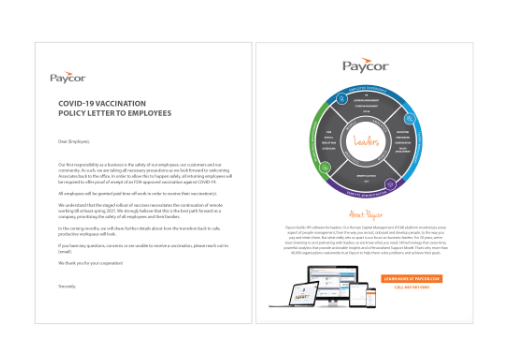Get Employees Ready for New Requirements
January 13, 2022 Update: The Supreme Court ruled to block the proposed vaccine-or-test mandate for large employers (businesses with 100 employees or more). In a separate ruling, the court voted in favor of a vaccine mandate for workers employed at healthcare facilities that receive federal funding through Medicare and Medicaid. It’s estimated that this ruling could affect more than 17 million workers.
For healthcare organizations and employers that choose to establish vaccination and testing requirements, Paycor is here to support you with an immunization tracker, expert HR advice and a comprehensive suite of products to help keep your business compliant. Contact our team or learn more here.
How Paycor Helps
To help employers manage this new requirement, Paycor now features an Immunization Tracker to help you track the immunization status of your employees. Employees can upload vaccination information using a self-service tool and employers can receive reports on immunization status across the organization to monitor compliance. For help with establishing policies and communication tools, Paycor customers can access the HR Support Center for a range of resources.
View our recently recorded webinar: Vaccine Mandates: What HR Needs to Know Now for more information on the proposed legislation and to learn how Paycor can help.
If you haven’t created an employee vaccination policy, here are important details you need to know—along with a free template to help you get started.
Can Employers Make a COVID Vaccine Mandatory?
To prevent the spread of COVID-19, the EEOC determined months ago that employers could make COVID vaccines mandatory as long as there were reasonable accommodations that would not pose an undue hardship on the operation of the employer’s business. As new variants emerge, we’re clearly not out of the woods yet and now employers are being required to act. Vaccines will only be really transformative if enough people receive them (at least 75%, according to Anthony Fauci).
And, now that vaccines are widely available, the federal government has mandated that private employers with more than 100 employees establish and enforce a vaccination policy requiring employees to get the vaccine or submit to weekly COVID-19 testing.
However, there are important compliance watchouts each step along the way. As you develop your policy, make sure you have all the information to communicate new requirements to your organization.
Employee Flu Vaccination Policies
We know COVID-19 is undoubtedly a more dangerous virus than flu, but it’s helpful to consider how the law deals with employee vaccination policies regarding yearly flu shots. In general, it is permissible to mandate that employees take a flu vaccine—but there are many notable exceptions.
For at-will employees, making flu shots mandatory requires only a sufficient business reason, like if your employees regularly deal with the sick or the elderly, who are especially vulnerable. However, this doesn’t mean that all employees have to take the vaccine.
Two common exceptions—identified by the EEOC—are that employees may have a religious objection to vaccines or, under the Americans With Disabilities Act, a qualifying disability (like those listed by the CDC) which puts them at increased risk of side effects when receiving vaccinations.
In industries where employees are not regularly in contact with vulnerable populations, proving a sufficient business reason to mandate vaccines is considerably harder. However, while this is true for flu, COVID-19 poses a “direct threat” to all, significantly altering the legal dynamics.
It remains true, though, that objections to vaccinations should be considered on an individual basis and employers should bear in mind that while they may have strong arguments on their side, any sense that vaccines are being forced on unwilling employees could harm company morale. It may be easier to offer an accommodation—such as remote work—rather than forcing the issue. Be sure to document all objections and subsequent accommodations, in order to prove that you followed due process.
What if Employees Refuse to Get Vaccinated?
In their guidance updated May 28, the EEOC determined that its laws do not prevent an employer from requiring all employees physically entering the workplace to be vaccinated for COVID-19. However, according to the mandate, unvaccinated employees who work for employers covered by the mandate are required to wear masks indoors and get an approved COVID-19 test every 7 calendar days.
- If an employee seeks an exception due to disability, under ADA employers are required to seek reasonable accommodation (such as remote work). However, if this is not possible, employers may exclude the employee from the workplace if it can be proved they pose a “direct threat” (see the EEOC guidance for an in-depth look at exact what counts).
- If an employee seeks an exception due to religious belief or practice, Title VII legislation requires that employers look to offer reasonable accommodation, although in this case only if doing so won’t cause ‘undue hardship’. If this isn’t possible, an employee may be excluded from the workplace. (But watch out: excluded from the workplace doesn’t necessarily mean their employment can be terminated.)
- If an employee simply doesn’t wish to be vaccinated, employers aren’t required to make accommodations. However, while these employees can be excluded from the workplace, businesses should think hard about whether they’ll be willing to discipline employees who refuse.
Creating a Vaccine Policy
A written vaccination policy helps clarify rules for your employees. And, for many employers, as of November 5, 2021, a vaccine policy is no longer a nice-to-have, it’s required for business and OSHA ETS compliance. However, you will want to be sure that you have reviewed the ETS FAQs so that you can develop a vaccination policy that make the most sense for your business. For example, if your remote-first workforce does not ever interact with other people indoors, your workers may be exempt from a vaccination mandate.
As you create your vaccination policy, you will also want to consider masking and testing requirements for unvaccinated employees. The federal mandate for employers with more than 100 employees requires that unvaccinated employees wear masks and get tested every 7 calendar days, regardless of work schedule.
To increase uptake, businesses can host vaccination drives on their premises and offer employees paid time off to receive their vaccines (and recover). It’s also important to keep in mind that the federal mandate pre-empts state and local laws, but employers should bear in mind that their right to mandate vaccines may be altered when dealing with unionized employees.
Paycor is not a legal, tax, benefit, accounting or investment advisor. All communication from Paycor should be confirmed by your company’s legal, tax, benefit, accounting or investment advisor before making any decisions.
Download Employee Mandatory Vaccination Policy Letter Template
Creating a COVID-19 vaccination policy is just the first step—next you need to communicate the details to your employees. To help businesses, Paycor is offering businesses a sample communication letter sharing your vaccination policy. Once downloaded, you can customize the text to your specific situation.
Legal Disclaimer: This document is intended for informational purposes only, and does not constitute legal information or advice. This information and all HR Support Center materials are provided in consultation with federal and state statutes and do not encompass other regulations that may exist, such as local ordinances. Transmission of documents or information through the HR Support Center does not create an attorney-client relationship. If you are seeking legal advice, you are encouraged to consult an attorney.











